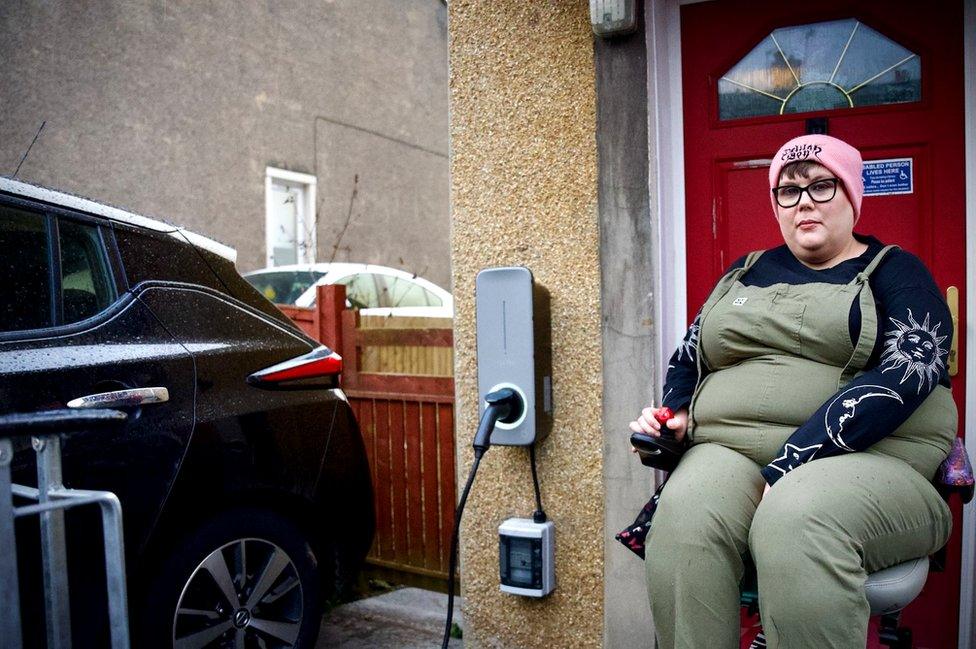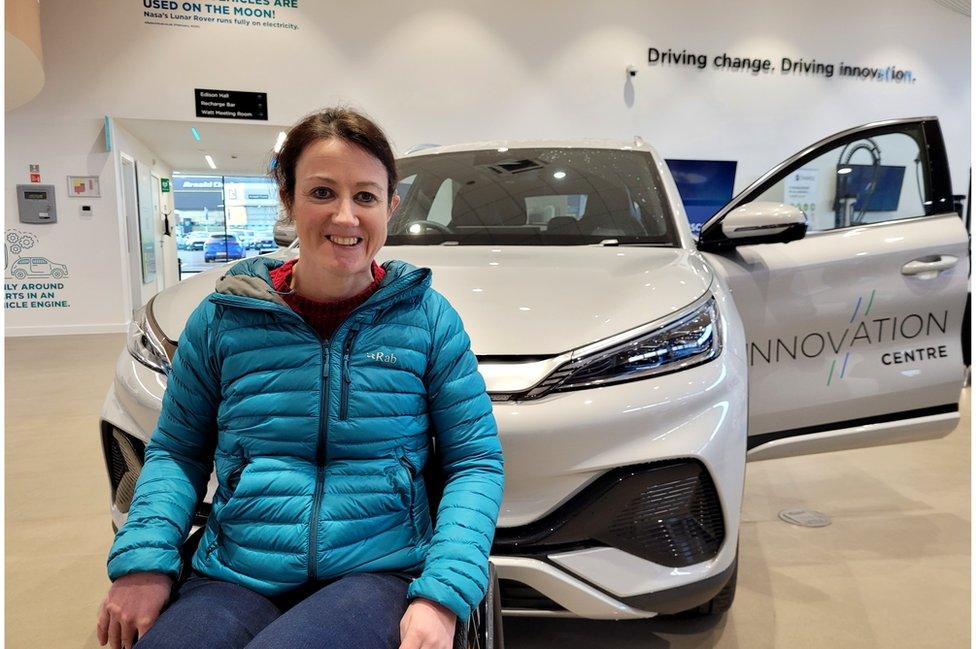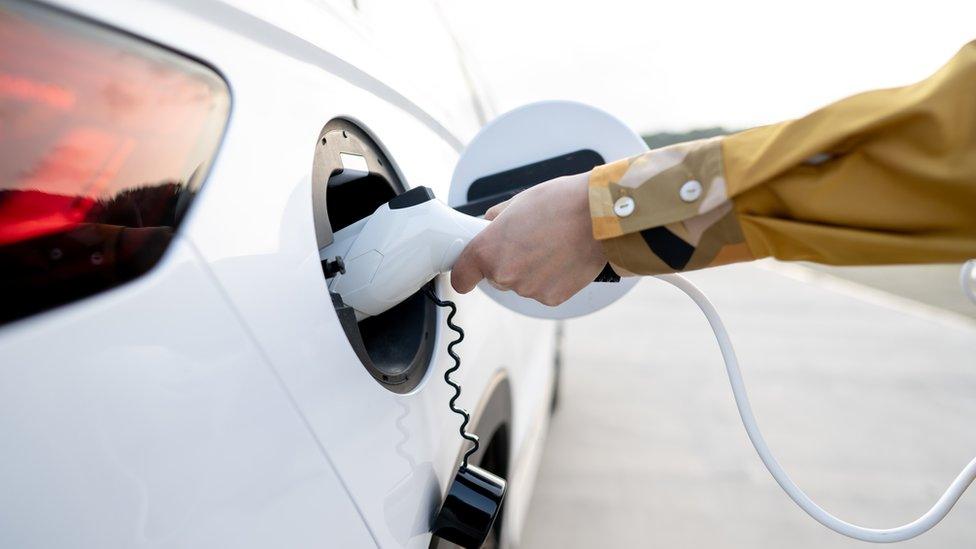'My electric car dreams turned into a nightmare'
- Published

A disabled driver has made the decision to move back to petrol after difficulties in using an electric vehicle (EV).
Shae Morgon, from Edinburgh, was "forced to compromise" as a disabled person after trying to do the right thing for the environment.
Shae, 33, has a connective tissue disorder, which affects mobility.
Initially, Shae chose a fully electric Nissan Leaf to reduce environmental impact.
However, with a deteriorating condition, a larger electric wheelchair was needed.
"We can't fit my main power chair into the car right now," said Shae, whose husband drives the car.
"As a result, we're changing to a wheelchair-accessible vehicle, which will be available in January. It's going to be a petrol vehicle."
The wheelchair-accessible vehicle that best meets their needs was thought to be the petrol Berlingo, which requires an advanced payment of £4,000 to Motability Operations Ltd, a UK-wide company that enables people to use disability benefits to lease a vehicle.
In contrast, the equivalent payment for the electric equivalent was £10,000, an "impossible task" on an income of disability benefits.
"I've had no option but to revert to petrol," Shae said.
"We can't be green in our travel choices and have a vehicle that suits our needs," Shae added. "It's a massive frustration not being able to practice what I preach."
There are thousands of charging points across Scotland, but Shae said they could be the source of further frustrations for disabled people beyond the cost of the vehicle.
"Most of the chargers are up a kerb, making them inaccessible for a wheelchair. I can't reach them to push any buttons or scan our card to start or stop the charging."
Scotland's national electric vehicle charging network Charge Place Scotland is owned and developed by the Scottish government.
They have funded the installation of 2,700 charging points since 2011 and are working on developing standards for accessible chargers to ensure future projects meet these criteria.
'Charging network disappointing'
A spokesperson for Transport Scotland said: "Ensuring electric charge points are accessible and user friendly for all is a core part of our approach to building out Scotland's charging infrastructure."
They added that all future Transport Scotland funding for installation of public EV charge points would require guarantees to "demonstrate appropriate measures will be taken to meet requirements and recommendations" specified in British standards.
By 2035, an estimated 2.7 million disabled people in the UK will either be drivers or passengers of electric vehicles, with half of them expected to depend on public charging infrastructure.
Disabled drivers and disabled people's organisations have raised concerns that this infrastructure is not accessible, adding another challenge in the transition to electric vehicles.
In the 2022/23 period, the UK government-backed Motability Scheme allocated £74.5m in grants and supported about 700,000 customers with a fleet of petrol, diesel, electric, and hybrid models.
Operated by an independent company called Motability Operations, the scheme covers vehicle purchase, insurance, and maintenance costs.
Running parallel to this is the Motability Foundation, a charity previously known as Motability which operates grant programmes, covering costs like advance payments and vehicle adaptations for those unable to afford them.
Motability Foundation head of innovation Catherine Maris said the new charging network was "disappointing".
"This is one of the biggest infrastructure shifts we've seen for generations," she said.
"So it should be an exciting opportunity to design inclusively and accessibly from the start. But unfortunately, in many cases, that's not what we're seeing."
She added: "A lot of the research that we've carried out to date has identified high kerbs, really heavy cables, inadequate spacing between bollards."

Is charging accessible for disabled people like me?

Julie McIlroy has a big decision to make in the New Year. Does she purchase an electric or fossil fuel vehicle?
The 38-year-old has cerebral palsy, a condition that affects her mobility.
Like Shae, Julie wants to do the right thing for the environment, but is the charging infrastructure accessible for disabled people like her?
Julie visited the Arnold Clark Innovation Centre in Glasgow to try out electric vehicles and the charging system for accessibility.
It was set up to give people like Julie the opportunity to try before they buy.
Speaking to BBC Scotland before delving into the world of EVs, Julie said: "The primary concern I have relates to the accessibility of charging stations.
"It forces me to consider whether the places I visit will allow me to charge it for several hours. Is that feasible in terms of accessibility?"
She added: "I need to examine the manual dexterity required to operate these charging stations."
Julie tried out a possible car, liked it, but said she still had reservations.
"I am certainly planning to switch to electric. However, I anticipate that using the charging stations will present some challenges."
Julie's experiences, like Shae's, reflect a wider issue in a green transition - the challenge of balancing environmental responsibility with the needs of disabled people.

According to critics, the poor charging network is inexcusable.
Graham Footer, chief executive of Disabled Motoring UK, said there were significant challenges for disabled motorists transitioning to EVs.
The group's recent survey suggested key barriers are prohibitive costs of accessible vehicles and poor accessible charging infrastructure. This is particularly impacting those without home charging options.
Disabled motorists felt neglected in the EV revolution, according to Mr Footer, who perceived a failure in making EVs and related infrastructure accessible.
"This situation contradicts government promises of inclusive green energy transitions," he said. "Despite willingness to adopt EVs for environmental reasons, many feel left behind by an industry that hasn't prioritised inclusive design."
Related topics
- Published6 December 2023

- Published6 December 2021
